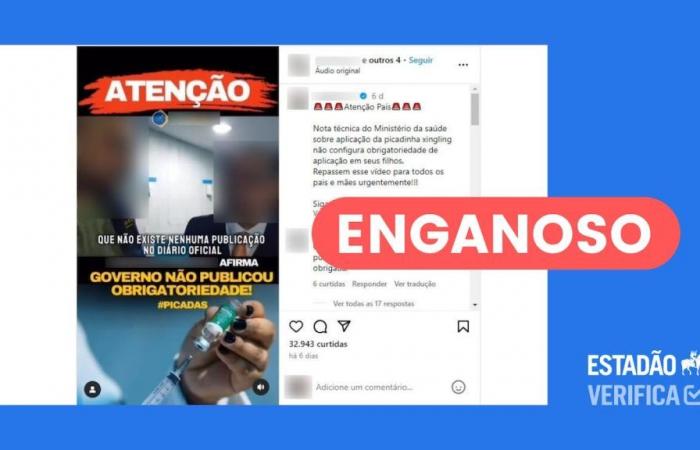What they are sharing: video in which a doctor says that the technical note that included the covid vaccine in the National Childhood Vaccination Calendar is “opinionated” and does not constitute a normative act. According to him, only the publication of an order or ordinance would make the vaccine mandatory and included in the calendar
Estadão Verifica investigated and concluded that: is misleading. The pediatric vaccine against Covid-19 was included in the National Immunization Program (PNI) and incorporated into the National Child Vaccination Calendar as of technical note nº 118/2023. Legal experts consulted by Checks stated that the note is a valid administrative act and has the effect of a standard.
When contacted, the doctor responsible for the video repeated that “the fact that the document is a valid and effective administrative act does not mean that it has the power to determine what it determined”.
continues after advertising
- Normative act: every act of the Brazilian State that establishes norms.
- Technical note: document that supports decision-making in public policies.
- Ordinance: internal normative act through which government bodies establish rules.
- Dispatch: document with the decision of an authority.
continues after advertising
Know more: The video verified here circulates on social media with the claim that the technical note would not be enough to make vaccination of children mandatory. In the recording, an infectious disease doctor argues that the document only offers a favorable opinion on the inclusion of the Pfizer Baby vaccine in the National Vaccination Calendar. But this is not true, according to Professor Fernando Aith, from the Faculty of Public Health at the University of São Paulo (USP). According to him, due to the way health legislation is organized, the note has normative power to include the vaccine in the program.
Aith highlights that, for the area of law, it would be formally more correct to publish a decree determining the inclusion of the vaccine in the PNI. This would not leave room for speeches that weaken the national immunization policy. However, this does not change the fact that the vaccine was included in the childhood vaccination schedule.
The author of the video says that the Minister of Health, Nísia Trindade, should have signed an order or published an ordinance determining the inclusion of the vaccine in the PNI. But this is also not disputed by Aith, who is director of the Health Law Research Center at USP.
continues after advertising
According to Aith, the validity of the technical note to include the vaccine against Covid-19 in the PNI can be explained based on law nº 6,259/75. The text, which established the National Immunization Program, states in articles 12 and 13 that “individuals and public or private entities are subject to control determined by the health authority”.
“In this case, the technical note was signed by the national secretary of Health Surveillance, the highest authority in Brazil on the National Immunization Program, and there is a clear indication of inclusion in the PNI. The note is a normative opinion, therefore, it has normative power. It’s not called an ordinance, but it has normative power”, pointed out Aith.
The technical note was signed by the Secretary of Health Surveillance, Ethel Maciel, and the director of the PNI department, Eder Gatti Fernandes. Therefore, in the opinion of administrative law specialist José Jerônimo de Lima, from the law firm Innocenti Advogados Associados, the technical note represents an act of the PNI authority. This eliminates the need to publish an ordinance.
continues after advertising
“It is a valid and effective administrative act,” said Lima. “This vaccine has already been included in the National Immunization Program. So I disagree (from the video)there is no need for an ordinance.”
The same argument is defended by lawyer Raphael de Matos Cardoso, who is also a specialist in administrative law. “The law that deals with epidemiological surveillance gives the Ministry of Health the responsibility of updating, preparing the PNI and including, or possibly excluding, the vaccine that it considers mandatory,” he said.
According to Professor Aith, the inclusion of vaccines in the PNI through a technical note is common in health legislation. “Traditionally, it was done like this. Until recently, before the vaccine was ideologized and it became a shallow policy instrument, all vaccines were included in the PNI through a technical note and management manual. All of them, it’s always been like this.”
continues after advertising
When contacted, the doctor responsible for the video argued that law 6,259/75 does not mention what the density of the normative act would be for the incorporation of a vaccine into the immunization program.
STF decided to make vaccination against covid mandatory
In 2020, the Federal Supreme Court (STF) judged three actions related to the possibility of the State determining compulsory vaccination against infectious diseases. In judging the actions, the ministers decided that mandatory immunization through vaccines is constitutional. They understood that compulsory vaccination does not mean forced vaccination.
continues after advertising
In this way, the State can, indeed, determine compulsory vaccination against Covid-19. Those who refuse vaccination may suffer from restrictive measures provided for by law, such as fines, being prevented from attending certain places or enrolling in school. No citizen is forcibly vaccinated. The ministers decided that the mandatory vaccinations included in the National Immunization Plan are constitutional.
Lawyer José Jerônimo explained that law 6,259/75 created the PNI, providing, in article 3, that the Ministry of Health would define mandatory vaccines. Article 39 of decree 11,798/23 gave the Department of the National Immunization Program the authority to define the implementation of mandatory vaccines.
“The normative act that regulated the PNI gave the person responsible for the program the responsibility to define and implement mandatory vaccines,” he explained. “There is no need for a normative act, in this case a decree from the Ministry of Health, dealing with the issue.”
According to the lawyer, the inclusion of a vaccine in the PNI is enough for it to become mandatory. “It is important to highlight that the STF decided that this obligation is constitutional. Mandatory immunization does not need a law or a normative act,” he said.
Ministry announces that vaccination is necessary to protect children against serious cases and deaths
In a note, the Ministry of Health reported that the PNI included the pediatric vaccine against Covid-19 in the National Vaccination Calendar to increase protection for babies from six months and children up to four years of age. According to the folder, this age group was the most affected by deaths caused by Covid.
The ministry reiterated that the vaccine is safe, has been widely tested inside and outside Brazil, and is approved by the National Health Surveillance Agency (Anvisa). “For these reasons, parents should take their children aged six months to 4 years to be vaccinated and, thus, increase children’s protection against serious cases and deaths,” he informed.
According to the folder, to integrate the SUS, a vaccine must receive authorization for use from Anvisa and comply with the definitions of the National Commission for the Incorporation of Technologies into the Unified Health System (Conitec).
The ministry also listed the main normative acts that instruct and give legitimacy to the PNI, to indicate the vaccines that are part of the National Vaccination Calendar. In the note, the folder mentions art. 3rd of law nº 6,259/75, decree nº 78,231/76, law nº 9,782/99 and law 12,401/11.
The ministry also highlighted that childhood vaccination is provided for in the Child and Adolescent Statute (ECA), and forwarded the text of the first paragraph of article 14, which states that “vaccination of children is mandatory in cases recommended by health authorities”.
What is the difference between an ordinance and a technical note?
See below for an explanation of the terms covered in this verification.
Normative act: according to professor Fernando Aith, a normative act is every act of the Brazilian State that has the power to define norms. A normative act can be a law, a decree, an ordinance, a resolution, a normative opinion or a normative technical note.
Technical note: as explained by lawyer José Jerônimo, a technical note is a document that, as a rule, aims to support the decision-making of an authority in the execution of a public policy. According to Jerônimo, the technical note does not have a form prescribed by law.
Ordinance: According to the glossary of the Institute of Applied Economic Research (Ipea), the ordinance is an “internal normative act through which government bodies establish their rules”. Through this document, it is possible to prepare “instructions for the application of laws or definitions for the organization and operation of services and actions”.
Dispatch: according to Jerônimo, order “is the decision or direction of a certain authority”.
What the author of the video says
The doctor speaking in the video is infectious disease specialist Francisco Cardoso, whose content has already been checked by Verifica (here and here). When contacted, Cardoso defended the same arguments cited in the video regarding technical note nº 118/2023. According to him, law 6,259/75 and decree 78,231/76 do not specify that the score is sufficient to determine a standard. In the doctor’s opinion, an order from the responsible authority is necessary for the vaccine to be included in the PNI and become mandatory.
Cardoso compared the technical note that included the vaccine in the childhood vaccination calendar, with another note on abortion in cases provided for by law, which was recently revoked by the Ministry of Health. According to Cardoso, “there is no normative difference between the two technical notes” .
Although both documents are a technical note, the note on abortion was annulled after repercussions among opposition politicians and influencers. As shown by the Checksthe Minister of Health, Nísia Trindade, suspended the text alleging that it did not undergo legal consultancy or all the necessary spheres of the department.
Tags: Doctor misinforms criticizing inclusion covid vaccines National Immunization Program
--





